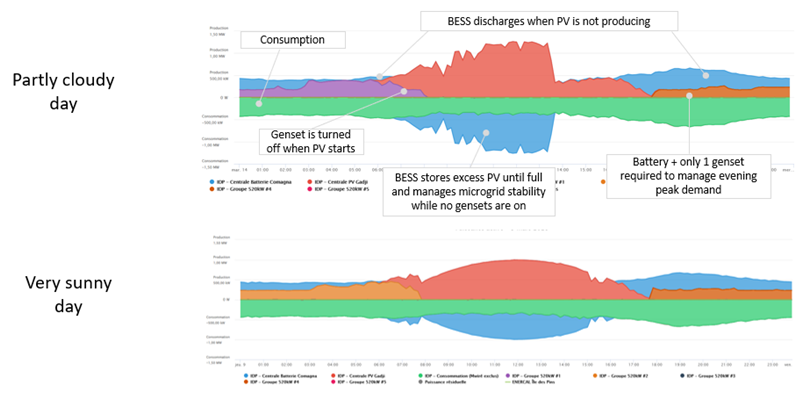Revolutionising Island Microgrids: A Case Study of Enercal's Transition to Renewable Energy Including Batteries Providing Grid Forming
Enercal's Island Microgrid project signifies a transformative shift from a diesel-dependent energy system to a sustainable, renewable energy-based grid. Prior to the project, the energy system was powered by five diesel groups (95%) and photovoltaics (5%). The project introduced battery grid-forming and group grid-following, with control aspects managed by our PMC and optimised by our EMS. The results were remarkable, with a 50% increase in renewable energy penetration within a month. This transition has halved CO2 emissions and diesel consumption, moving from 100% diesel to a system where no group is required 50% of the time. This presentation will explore the complexities of this transition and highlight the benefits to customers and the environment.

Key Learning Points:
- Improving grid resilience: Batteries play a 'grid-forming' role in achieving 100% uptime and improving grid resilience.
- Increasing system resilience: the importance of reserve management in increasing system resilience.
- Reducing operational costs: significant reduction in operational costs through transition to optimised renewable energy.
- Maximising environmental and economic benefits: The environmental and economic benefits of transitioning from a diesel-dependent system to a renewable grid.

Jean Dobrowolski
Microgrid Expert
Energy Pool
From 2014 to 2017, Dr. Jean Dobrowolski worked as an industrial PhD in collaboration with the French company Schneider Electric, the control laboratory of Grenoble (GIPSA lab) and the Electrical Engineering Laboratory of Grenoble (G2Elab). He received a PhD degree in 2017 from the Grenoble-Alpes University, France. His PhD research title was "Modelling, control and certification of an electrical decentralised microgrid with random exogenous inputs and constrained information ". The main objective was to design the control algorithms of islanded microgrid, to ensure both frequency/voltage stability and to maximise renewable energy sharing. Jean joined Energy Pool in 2019.

Microgrid Expert
Energy Pool
From 2014 to 2017, Dr. Jean Dobrowolski worked as an industrial PhD in collaboration with the French company Schneider Electric, the control laboratory of Grenoble (GIPSA lab) and the Electrical Engineering Laboratory of Grenoble (G2Elab). He received a PhD degree in 2017 from the Grenoble-Alpes University, France. His PhD research title was "Modelling, control and certification of an electrical decentralised microgrid with random exogenous inputs and constrained information ". The main objective was to design the control algorithms of islanded microgrid, to ensure both frequency/voltage stability and to maximise renewable energy sharing. Jean joined Energy Pool in 2019.
